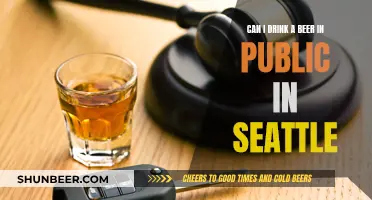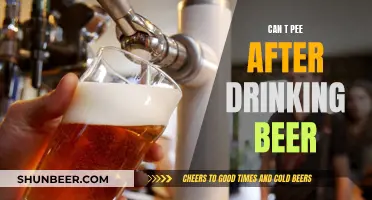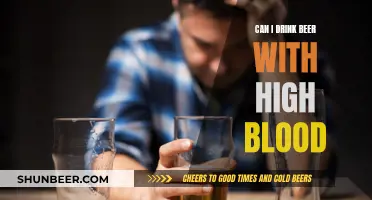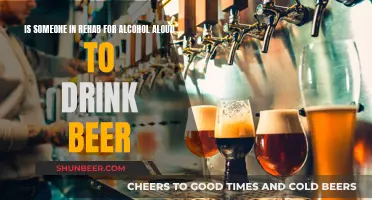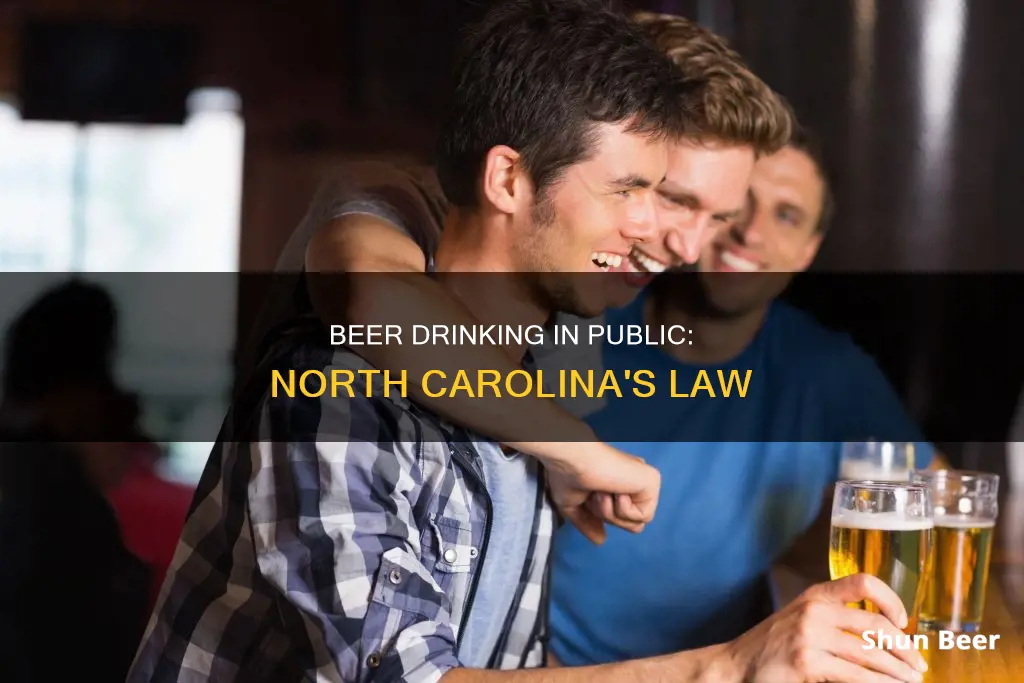
North Carolina has some complicated and unique laws regarding the consumption of alcohol. While public intoxication is not a crime in the state, drinking in public places is usually illegal. However, some cities in North Carolina have adopted the concept of 'Social Districts', designated areas where people can walk around with open containers of beer, wine, and other alcoholic beverages. In this context, it is important to note that North Carolina has open container laws that apply to both motor vehicles and public places, with specific regulations for different types of alcohol.
| Characteristics | Values |
|---|---|
| Drinking in public places | Illegal, except in certain cities that have created "Social Districts" |
| Drinking in motor vehicles | Illegal, except in vehicles designed for paid transportation (e.g. limos, taxis) and vehicles with living quarters (e.g. RVs, campers) |
| Drinking laws by alcohol type | Beer and wine: can be possessed, served, and consumed anywhere and anytime unless prohibited by statute. Hard liquor: can only be possessed, served, and consumed where the law specifically allows. |
| Selling alcohol | Illegal unless the seller has a permit from the Alcoholic Beverage Control (ABC) Commission |
| Happy hours | Illegal, except for food specials |
| Bottomless drinks | Illegal |
| Alcohol sales on Sundays | Restricted |
| Public intoxication | Not a crime, but intoxicated individuals can be taken into protective custody |
| Dry counties | Graham County in western North Carolina is the only dry county in the state |
What You'll Learn
- Drinking in public places is illegal in North Carolina, except in certain cities
- Open containers of alcohol are prohibited in vehicles, except in some cases
- Alcohol sales are restricted on Sundays in North Carolina
- North Carolina has a 'dry county' where alcohol sales are illegal
- Public intoxication is not a crime in North Carolina

Drinking in public places is illegal in North Carolina, except in certain cities
Drinking in public places is generally illegal in North Carolina. However, there are certain exceptions and specific rules that apply to this law.
Firstly, it is important to distinguish between the consumption of malt beverages (such as beer, lager, and ale) and unfortified wine, and the consumption of fortified wine and spirituous liquor (such as bourbon, gin, and vodka).
For malt beverages and unfortified wine, local city or county ordinances regulate consumption or possession of open containers in public places. For example, the city of Charlotte has made it illegal to possess or consume these beverages in public streets, sidewalks, or train platforms.
On the other hand, the consumption or possession of open containers of fortified wine and spirituous liquor in public places is regulated by a statewide law enacted by the Alcohol and Beverage Control (ABC) Commission of North Carolina. This law specifies that these types of alcohol can only be possessed or consumed in certain places, such as one's own home or residence, or with the consent of the property owner if the property is not primarily used for commercial purposes or open to the public.
Additionally, North Carolina has created "Social Districts" in some cities, which are designated areas where people are allowed to walk around with open containers of beer, wine, and other alcoholic beverages. These districts were established by Governor Roy Cooper in response to the pandemic, which forced businesses to stop indoor dining. Cities that have adopted this trend include Albemarle, Salisbury, Hickory, Asheville, Greensboro, Kannapolis, Monroe, Newton, and Wilmington.
It is also worth noting that while public intoxication is not a crime in North Carolina, it is unlawful to be disruptive while intoxicated in public, and one could be charged with a Class 3 misdemeanor for certain behaviours such as interfering with traffic, challenging others to fight, or panhandling.
Beer After Best Before Date: Is It Safe to Drink?
You may want to see also

Open containers of alcohol are prohibited in vehicles, except in some cases
North Carolina has strict laws regarding open containers of alcohol in vehicles. Both open and closed containers of alcoholic beverages are prohibited in all commercial motor vehicles, such as buses, trucks, and taxis. Open containers of alcohol are also banned in the passenger areas of any motor vehicle located on a highway or highway right-of-way, even if the vehicle is parked. This includes open containers of beer, malt liquor, ale, and unfortified wine, such as champagne or table wine.
However, there are some exceptions to these rules. Open containers of alcohol are allowed in vehicles designed, maintained, or used primarily for paid transportation, such as limos, taxicabs, Ubers, or buses. Additionally, open containers are permitted in the living quarters of motor homes or house cars, such as RVs or campers. These exceptions do not apply to spirituous liquor, mixed drinks, or fortified wine, which are always unlawful in the passenger area of any motor vehicle.
The laws regarding open containers in vehicles also specify the amount of unopened alcoholic beverages that can be transported without a permit. For malt beverages, up to 80 liters can be transported, with no limit on draft malt beverages in kegs. For unfortified wine, the limit is 20 liters, while for fortified wine or spirituous liquor, the limit is eight liters, or a combination of the two not exceeding eight liters.
While North Carolina has strict laws regarding open containers in vehicles, the laws regarding open containers in public spaces vary by city and county. In some cities, such as Charlotte, it is illegal to possess or consume open containers of alcohol in public streets, sidewalks, or train platforms. However, other cities have created "Social Districts," designated areas where people are allowed to walk around with open containers of beer, wine, and other alcoholic beverages. These districts were established in response to the pandemic, which forced businesses to stop indoor dining.
Beer and Medication: Safe or Not?
You may want to see also

Alcohol sales are restricted on Sundays in North Carolina
North Carolina has a vibrant alcohol industry, with a thriving craft beer scene, an expanding wine industry, and a growing community of local distilleries. However, the state has some unique laws regulating the sale and consumption of alcohol.
One notable restriction is that alcohol sales are limited on Sundays. ABC stores, which are government-owned liquor stores, are closed on Sundays. This restriction also applies to liquor sales in grocery stores and other licensed retailers. While the "brunch bill" signed into law in 2017 allowed restaurants to serve alcoholic beverages earlier, at 10 a.m. on Sundays, it didn't change the fact that liquor stores remain closed on this day.
The restriction on Sunday alcohol sales is just one of the many regulations governing the sale and consumption of alcohol in North Carolina. The state has a complex three-tier system for alcohol distribution, with sales overseen by the North Carolina Alcoholic Beverage Control Commission (ABC). This system creates a distinct environment for consumers and industry players, shaping how alcohol is sold and consumed in the state.
In addition to the Sunday sales restriction, North Carolina has other unique alcohol regulations. For example, "Happy Hour" drink specials are illegal, and establishments can only offer food specials during this time. Bottomless mimosas and other "bottomless" drink offers are also prohibited. The state also has strict rules for transporting cocktails to-go and open containers in vehicles.
While North Carolina has a robust alcohol industry, these restrictions can create challenges for both consumers and businesses. It's important for individuals and establishments to stay informed about the state's alcohol laws to ensure compliance and avoid penalties.
Beer and Anemia: Is It Safe to Drink?
You may want to see also

North Carolina has a 'dry county' where alcohol sales are illegal
North Carolina has some interesting laws related to alcohol, including the existence of a "dry county" where alcohol sales are illegal. Graham County, located in the western part of the state on the Tennessee border, was previously the only completely dry county in North Carolina. This means that the sale of alcohol was prohibited throughout the county, including in the town of Robbinsville. The county's conservative Baptist presence and religious influence were cited as factors that contributed to its teetotaling stance.
However, recent changes have allowed for some alcohol sales in Graham County. In 2024, voters in Robbinsville, the county seat, approved a measure to permit selected alcohol sales in local businesses. Additionally, a few resorts in the area have obtained special licenses to sell alcohol to tourists, who often consider it a necessary amenity.
While Graham County was previously the only completely dry county in North Carolina, other counties in the state have a mix of dry and wet areas. For example, McDowell County is officially dry, but the city of Marion has its own municipal ABC board. Similarly, Buncombe County is considered dry, but it has local ABC boards in Asheville, Black Mountain, Weaverville, and Fletcher, allowing for alcohol sales in these municipalities.
It's worth noting that North Carolina has unique alcohol laws regarding "Happy Hours," bottomless drinks, and Sunday sales. "Happy Hour" drink specials are illegal, and restaurants and bars can only offer food specials. If drink specials are offered, they must last for the entire day. Bottomless drinks, such as mimosas, are also prohibited by state law. In terms of Sunday sales, ABC stores are closed, but restaurants and other licensed establishments can serve alcohol starting at 10 a.m.
Beer and Prostate Surgery: What You Can Drink Post-Op
You may want to see also

Public intoxication is not a crime in North Carolina
North Carolina has a unique set of rules regarding the sale, purchase, and consumption of alcohol. While public intoxication is not a crime in the state, there are still some important regulations to keep in mind.
Firstly, it's important to understand the distinction between different types of alcoholic beverages in North Carolina. The state's laws differentiate between malt beverages (such as beer, lager, and malt liquor), unfortified wine, fortified wine, and spirituous liquor (such as vodka, gin, and bourbon). The rules for possessing, serving, and consuming these beverages vary.
For malt beverages and unfortified wine, local city or county ordinances regulate consumption or possession of open containers in public places like sidewalks and train platforms. In Charlotte, North Carolina, for example, it is illegal to possess or consume these beverages in public streets, sidewalks, or train platforms. However, in other cities or counties, there may be designated areas called Social Districts where people are allowed to walk around with open containers of alcohol. These districts were introduced during the pandemic to support businesses that had to stop indoor dining.
For fortified wine and spirituous liquor, the rules are more stringent. The statewide law of North Carolina, regulated by the Alcoholic Beverage Control (ABC) Commission, governs the possession and consumption of these beverages. It is illegal to possess or consume fortified wine or spirituous liquor in public places like sidewalks. However, it is allowed to possess and consume these beverages in one's own home or residence, or with the consent of the property owner if the property is not primarily used for commercial purposes or open to the public.
While public intoxication is not a crime in North Carolina, it's important to maintain orderly behaviour while intoxicated. Disruptive behaviour while intoxicated can lead to charges under N.C. Gen. Stat. Ann. § 14-444, which includes blocking traffic, interfering with access to buildings, engaging in physical altercations, insulting others, or panhandling.
In summary, North Carolina has a complex set of regulations surrounding alcohol. While public intoxication is not a crime, there are rules governing the consumption and possession of different types of alcoholic beverages, and disruptive behaviour while intoxicated can lead to legal consequences.
Beer and Mono: Is It Safe to Drink?
You may want to see also
Frequently asked questions
Drinking beer in public is generally prohibited in North Carolina. However, some cities have created Social Districts, designated areas where people can walk around with open containers of beer and other alcoholic beverages.
No, open alcoholic beverages are prohibited in the passenger areas of a vehicle. Alcohol is only allowed inside a vehicle if it is in an unopened container.
Public intoxication is not a crime in North Carolina. However, it is illegal to cause a disturbance while intoxicated in public.
North Carolina has a dry county where the sale of alcohol is illegal. Graham County in western North Carolina is the only dry county in the state.
Yes, it is generally okay to possess, serve, and consume beer at city or county events and on city and county property. However, the sale of beer requires a permit.


